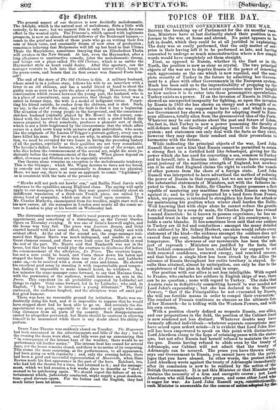The distressing uncertainty of Mario's vocal powers gave rise to
a dis- appointment, and something of a disturbance, at.the Covent Garden Opera on Thursday evening. It was one of Grisi's farewell nights, and the house was very full. The piece was Lucrezia Borgia, and Grisi exerted herself with her usual effect, but Mario sang feebly and with evident effort. At the end of the second act, the stage-manager inti- mated that Signor Mario was much indisposed, and unable to go on. Great clamour ensued, and there were loud cries for Tamberlik to read the rest of the part. Mr. Harris said that Tamberlik was not in the house, but that the band would play the overture to Guillaume Tell before the commencement of the afterpiece, La Prone. The' overture began, but not a note could be heard, and Costa threw down his baton and stopped the band. The curtain then rose for La Prove, and Lablache came on,—to be received with a storm of cries and hisses. He showed his excellent good sense by standing it with imperturbable good temper ; but, finding it impossible to make himself heard, he withdrew. In a few minutes the stage-manager came forward, to say that Madame Grisi, with the permission of the audience, would introduce an aria in the Prom. This expedient (in all probability suggested by Lablache) set things to rights. Grisi came forward, led in by Lablache; who said, in English, " I beg leave to introduce a young debutante." The lady curtseyed, the audience laughed, and the afterpiece went off amid per- fect good humour.
There was here no reasonable ground for irritation. Mario was un- doubtedly doing his best, and it is impossible to suppose that he would have stopped short had he been able to go on. But certainly the dis- appointment was great, especially to the numbers of people who came long distances from all parts of the country. Such disappointments cannot be altogether prevented, but Mario should be cautious in allowing himself to be announced while there is any doubt about his ability to perform.


































 Previous page
Previous page